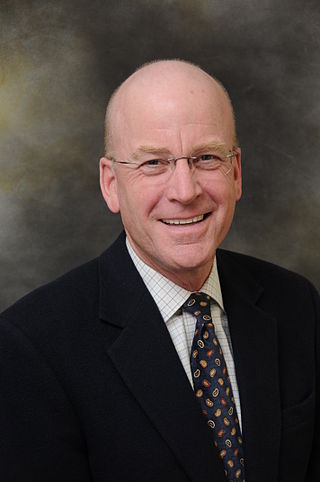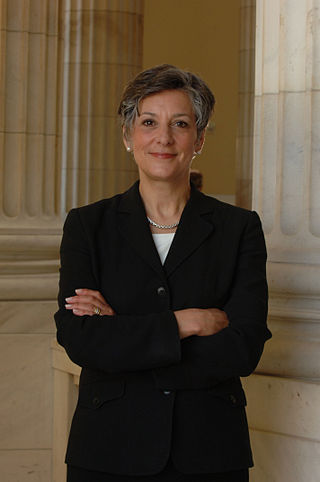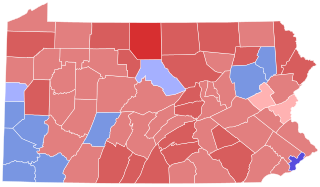
Joseph Merrill Hoeffel III is an American author and politician. A Democrat, Hoeffel was a member of the United States House of Representatives from 1999 to 2005, representing Pennsylvania's 13th congressional district. He also served multiple terms on the Montgomery County Board of Commissioners, and from 1977–84, was a member of the Pennsylvania House of Representatives. A native of Philadelphia, he is a graduate of Boston University and Temple University School of Law.

The 1994 United States Senate elections were held November 8, 1994, with the 33 seats of Class 1 contested in regular elections. Special elections were also held to fill vacancies. The Republican Party took control of the Senate from the Democrats. Like for most other midterm elections, the opposition, this time being the Republicans, held the traditional advantage. The congressional Republicans campaigned against the early presidency of Bill Clinton, including his unsuccessful healthcare plan. Democrats held a 56–44 majority, after having lost a seat in Texas in a 1993 special election.

The 1988 United States Senate elections were elections for the United States Senate. Held on November 8, 1988, the 33 seats of Class 1 were contested in regular elections. In spite of the Republican victory by George H. W. Bush in the presidential election, the Democrats gained a net of 1 seat in the Senate. 7 seats changed parties, with 4 incumbents being defeated. The Democratic majority in the Senate increased by one to 55–45.

The 1982 United States Senate elections were held on November 2, 1982. They were elections for the United States Senate following Republican gains in 1980. The 33 Senate seats of Class 1 were up for election in 1982. A total of four seats changed hands between parties, with Democrats winning seats in New Jersey and New Mexico, and Republicans taking seats in Nevada and the seat of the lone independent, Senator Harry Byrd Jr., in Virginia. Democrats made a net gain of one seat bringing them to 46 seats, while Republicans stayed at 54 seats for a majority. However, the Democratic gain in New Jersey replaced a Republican that had been appointed earlier in the year. Liberal Republicans senators in Connecticut, Rhode Island and Vermont held onto their seats, keeping the Senate in Republican hands.

The 1980 United States Senate elections were held on November 4, coinciding with Ronald Reagan's victory in the presidential election. The 34 Senate seats of Class 3 were contested in regular elections. Reagan's large margin of victory over incumbent Jimmy Carter gave a huge boost to Republican Senate candidates, allowing them to flip 12 Democratic seats and win control of the chamber for the first time since the end of the 83rd Congress in January 1955.

The 1976 United States Senate elections was an election for the United States Senate. Held on November 2, the 33 seats of Class 1 were contested in regular elections. They coincided with Democrat Jimmy Carter's presidential election and the United States Bicentennial celebration. Although almost half of the seats decided in this election changed parties, Carter's narrow victory did not provide coattails for the Democratic Party. Each party flipped seven Senate seats, although, one of the seats flipped by Democrats was previously held by a Conservative.

Allyson Schwartz is an American Democratic Party politician who represented parts of Montgomery County and Northeast Philadelphia in the United States House of Representatives from 2005 to 2015 and Northeast and Northwest Philadelphia in the Pennsylvania Senate from 1991 to 2005. She has finished second in a statewide Democratic Party primary twice: for United States Senate in 2000 and for Governor in 2014.

The 2006 United States Senate election in Pennsylvania was held on November 7, 2006. Incumbent Republican Rick Santorum ran for re-election to a third term, but was defeated by Democratic State Treasurer Bob Casey, Jr., the son of former Pennsylvania governor Bob Casey Sr. Casey was elected to serve between January 3, 2007, and January 3, 2013.
The Pennsylvania Republican Party (PAGOP) is the state affiliate of the Republican Party in Pennsylvania. It is headquartered in Harrisburg. Its chair is Lawrence Tabas and is the second largest political party in the state behind the Pennsylvania Democratic Party.

The 1991 United States Senate special election in Pennsylvania was held on November 5, 1991, after incumbent Republican Senator John Heinz died in a plane crash on April 4 of that year. Democrat Harris Wofford was appointed to the seat by Governor Bob Casey, and won the general election in a landslide over Republican Dick Thornburgh, a former Governor and U.S. Attorney General. Wofford became Pennsylvania's first Democratic Senator since Joseph S. Clark, Jr. left office in 1969. Major-party candidates for this election were chosen by party committees, as the vacancy had happened too late for a primary to be held.

The 2000 United States Senate election in Pennsylvania was held on November 7, 2000, during a year which coincided with a United States presidential election in which Pennsylvania was viewed as a swing state. Pennsylvania was one of four states that elected Republican Senators despite being won by Al Gore in the concurrent presidential election, the others being Maine, Rhode Island and Vermont.

The 2004 United States Senate election in Pennsylvania was held on November 2, 2004. Incumbent Republican Senator Arlen Specter won re-election to a fifth term. As of 2024, this is the last time a Republican statewide candidate won Montgomery and Delaware Counties and won more than 25% of the vote in Philadelphia. Specter later lost renomination in 2010 as a Democrat, having joined the party in April 2009.

The 1994 United States Senate election in Pennsylvania was held November 8, 1994. Incumbent Democratic U.S. Senator Harris Wofford, who was appointed to the position in 1991 and won a special election the same year, sought re-election to a full six-year term, but he was defeated by Republican Rick Santorum. By a margin of 2.5%, this election was the second-closest race of the 1994 Senate election cycle, behind only the election in California.
Jonathan A. Saidel is a politician from Philadelphia, Pennsylvania. He is a former Philadelphia city controller.

The 1980 United States Senate election in Pennsylvania was held on November 4, 1980. Incumbent Republican U.S. Senator Richard Schweiker decided to retire, instead of seeking a third term.

The 2012 United States Senate election in Pennsylvania was held on November 6, 2012, alongside a presidential election, other elections to the United States Senate in other states, as well as elections to the United States House of Representatives and various state and local elections. Incumbent Democratic U.S. Senator Bob Casey, Jr. ran for and won re-election to a second term, defeating Republican nominee Tom Smith, and Libertarian nominee Rayburn Smith.

The 1976 United States Senate election in Pennsylvania was held on November 2, 1976. Incumbent Republican U.S. Senator and Minority Leader Hugh Scott decided to retire. Republican John Heinz won the open seat.

The 2012 United States presidential election in Pennsylvania took place on November 6, 2012, as part of the 2012 United States presidential election in which all 50 states plus the District of Columbia participated. The primary election to select the Democratic and Republican candidates had been held on April 24, 2012. Pennsylvania voters chose 20 electors to represent them in the Electoral College via a popular vote pitting incumbent Democratic President Barack Obama and his running mate, Vice President Joe Biden, against Republican challenger and former Massachusetts Governor Mitt Romney and his running mate, Congressman Paul Ryan. Pennsylvania's electoral vote number was a reduction from the 2008 delegation, which had 21 electors. This change was due to reapportionment following the 2010 United States Census. Pennsylvania's 20 electoral votes are allotted on a winner-take-all basis.
Joseph C. Vignola, Sr. is an American Democratic politician from Philadelphia, Pennsylvania.

The 1982 United States Senate election in Pennsylvania was held on November 2, 1982. Incumbent Republican U.S. Senator John Heinz successfully sought re-election to another term, defeating Democratic nominee Cyril Wecht.




















